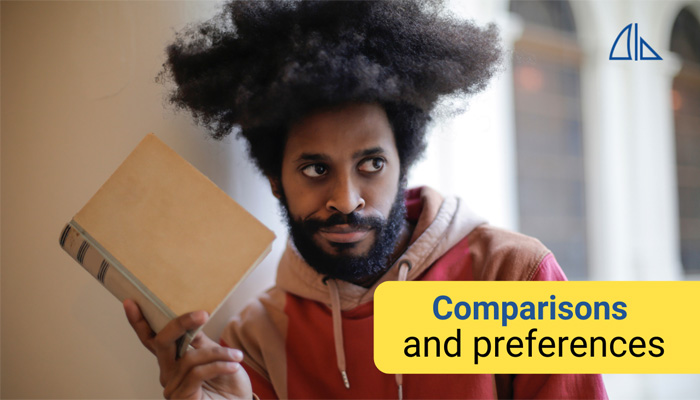Comparisons and preferences in Portuguese
Traveling is an important part of our lives. Traveling, we broaden our horizons, we learn how to live differently, to compare different cultures and to get charged with positive emotions. It is always new experiences and variety. Therefore, today we will learn a little grammar and vocabulary in the context of this interesting topic.

Verbs
In order not only to talk about your journey, but also to conduct a dialogue – to ask questions to your interlocutor, you need to learn two verbs that are similar in meaning. These are the verbs “saber” and “conhecer” which mean “to know.” However, they are used in different situations.
Firstly, in the table below you will see the conjugation forms of the verb “conhecer“:
| Verbo “conhecer“ | |
| Eu | conheço |
| Tu | conheces |
| Ele, ela, você | conhece |
| Nós | conhecemos |
| Eles, elas, vocês | conhecem |
Let’s see examples first and then read the explanation:
A: Sabes algo sobre esta praça? (Do you know anything about this square?)
B: Não, não posso ajudar. Conheço mal esta cidade. (No, I can’t help. I don’t know this city well.)
A: Sabes ler em russo? Aqui há alguma informação. (Can you read in Russian? There is some information here.)
Already guess how the verbs differ in meaning? So, we use the verb “saber” when we say that we know how to do something or know some information. Whereas the verb “conhecer” is used in relation to places, people and things.
Degrees of comparison
Sometimes we want to compare cities and countries, and not only that. Let’s find out how to do it in Portuguese.
For this, there are stable structures:
• mais … do que – more … than
• menos … do que – less … than
• tão … como – just like … as well as
Instead of “…” we insert any adjective. That is:
A Avenida da Liberdade é mais longa do que a rua Augusta. (The Liberty Avenue is longer than Augusta Street.)
Caldas da Rainha é menos barulhenta do que o Porto. (Caldas da Rainha is less noisy than Porto.)
Esta casa é tão bonita como aquela. (This house is as beautiful as that one.)
However, there are some exceptions. In Portuguese, we cannot say “mais bom“, “mais mau” and “mais grande“. You need to use the following forms:
• mais + bom = melhor(es) – better
• mais + mau = pior(es) – worse
• mais + grande = maior(es) – bigger
Pay attention to the examples:
Este hotel é melhor do que o outro. (This hotel is better than the other.)
O teu percurso é pior do que o meu. (Your route is worse than mine.)Lisboa é maior do que Évora. (Lisbon is bigger than Évora.)
After reviewing this information, we can easily create superlatives by adding definite articles:
Este prédio é o mais bonito de todos. (This building is the most beautiful of all.)
O meu carro é o pior do Mundo. (My car is the worst in the world.)
Now you can compare objects, people and of course trips!
Preferences
Our tastes differ in everything. Each person has their own preferences in absolutely every area of interest. The verb “preferir” (to prefer) will help us express this.
You can see the forms of its conjugation in the table below:
| Verbo “preferir“ | |
| Eu | prefiro |
| Tu | preferes |
| Ele, ela, você | prefere |
| Nós | preferimos |
| Eles, elas, vocês | preferem |
Also note that all verbs with the ending “-ir” and the letter “e” in the penultimate syllable have the similar form for the pronoun “eu“: sentir (to feel) – eu sinto; repetir (to repeat) – eu repito
Nós preferimos ir ao teatro. (We prefer to go to the theater.)
Eu prefiro jantar em casa. (I prefer to diner at home.)
Ela prefere sumo ou cerveja? (Does she prefer juice or beer?)
We see that the verb “preferir” does not require any preposition after itself. However, if we want to say that we prefer one over the other, then we need the preposition “a“. It, in turn, will merge with the article.
Prefiro Lisboa ao Porto. (I prefer Lisbon to Porto.)
O Joel prefere chá a café. (Joel prefers tea to coffee.)
That is, using the verb “preferir” and the preposition “a” we can compare two objects and express our preference for one of them.
Variety
In order to show the diversity of our preferences, we can use the adjective: vários / várias (various, several).
No jardim da minha mãe há várias flores. (My mom has many different flowers in the garden.)
Eu já viajei por vários países. (I have already traveled to various countries.)
As you can see, this adjective is inflected by gender, but not by number. That is, it does not have a singular form and is not used with singular nouns. Because the word “variety” always means “a lot“.
Conclusion
It is very important to learn Portuguese in the context of practical and enjoyable topics. Only in this way the learning process will be natural. Do you like this approach? Then let’s meet in our class!
Leave a Reply